talking english素材,日常美语的巧妙联系与运用
- 格式:doc
- 大小:118.00 KB
- 文档页数:45
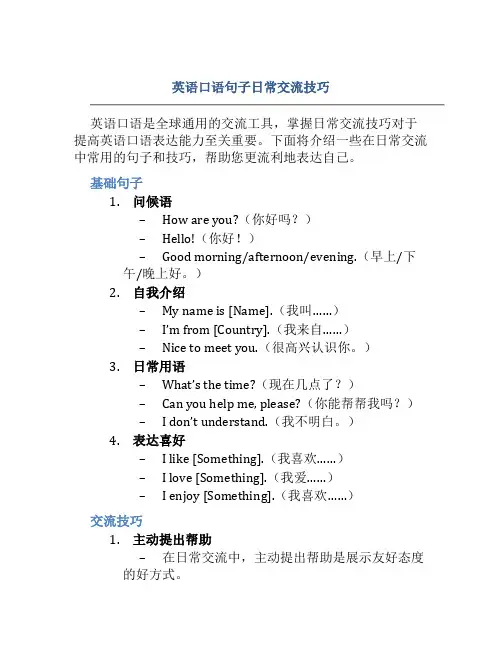
英语口语句子日常交流技巧英语口语是全球通用的交流工具,掌握日常交流技巧对于提高英语口语表达能力至关重要。
下面将介绍一些在日常交流中常用的句子和技巧,帮助您更流利地表达自己。
基础句子1.问候语–How are you?(你好吗?)–Hello!(你好!)–Good morning/afternoon/evening.(早上/下午/晚上好。
)2.自我介绍–My name is [Name].(我叫……)–I’m from [Country].(我来自……)–Nice to meet you.(很高兴认识你。
)3.日常用语–What’s the time?(现在几点了?)–Can you help me, please?(你能帮帮我吗?)–I don’t understand.(我不明白。
)4.表达喜好–I like [Something].(我喜欢……)–I love [Something].(我爱……)–I enjoy [Something].(我喜欢……)交流技巧1.主动提出帮助–在日常交流中,主动提出帮助是展示友好态度的好方式。
2.保持礼貌–无论何时,都要保持礼貌。
请说“请”、“谢谢”等礼貌用语。
3.练习听力–提高听力是提高口语的关键。
多听英语广播、音乐、电影等。
4.勇敢开口–不要担心犯错,练习是提高口语的唯一途径。
勇敢地开口说出来。
实战演练现在,让我们一起实战演练一些日常交流句子:•A: How are you?•B: I’m fine, thank you. And you?•A: Can you help me, please?•B: Of course, what do you need help with?•A: What’s the time?•B: It’s 3 o’clo ck.通过不断练习这些句子和技巧,您将会在日常英语口语交流中变得更加得心应手,展示出你的自信和友好。
希望这些内容对您有所帮助,加油!。
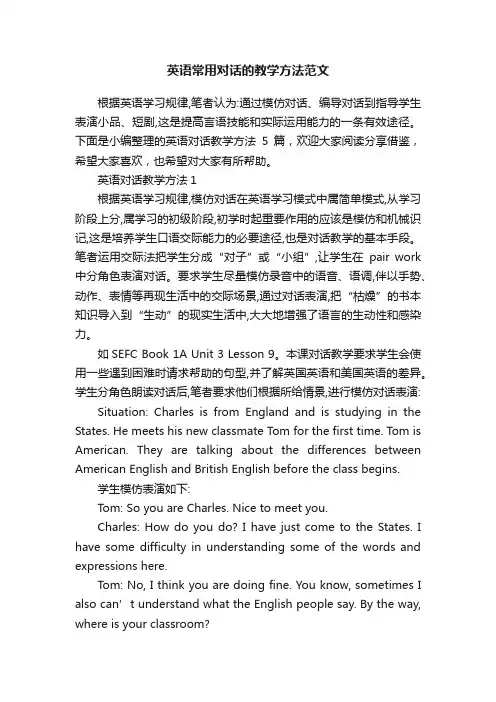
英语常用对话的教学方法范文根据英语学习规律,笔者认为:通过模仿对话、编导对话到指导学生表演小品、短剧,这是提高言语技能和实际运用能力的一条有效途径。
下面是小编整理的英语对话教学方法5篇,欢迎大家阅读分享借鉴,希望大家喜欢,也希望对大家有所帮助。
英语对话教学方法1根据英语学习规律,模仿对话在英语学习模式中属简单模式,从学习阶段上分,属学习的初级阶段,初学时起重要作用的应该是模仿和机械识记,这是培养学生口语交际能力的必要途径,也是对话教学的基本手段。
笔者运用交际法把学生分成“对子”或“小组”,让学生在pair work 中分角色表演对话。
要求学生尽量模仿录音中的语音、语调,伴以手势、动作、表情等再现生活中的交际场景,通过对话表演,把“枯燥”的书本知识导入到“生动”的现实生活中,大大地增强了语言的生动性和感染力。
如SEFC Book 1A Unit 3 Lesson 9。
本课对话教学要求学生会使用一些遇到困难时请求帮助的句型,并了解英国英语和美国英语的差异。
学生分角色朗读对话后,笔者要求他们根据所给情景,进行模仿对话表演: Situation: Charles is from England and is studying in the States. He meets his new classmate Tom for the first time. Tom is American. They are talking about the differences between American English and British English before the class begins.学生模仿表演如下:Tom: So you are Charles. Nice to meet you.Charles: How do you do? I have just come to the States. I have some difficulty in understanding some of the words and expressions here.Tom: No, I think you are doing fine. You know, sometimes I also can’t understand what the English people say. By the way, where is your classroom?Charles: On the ground floor.Tom: Would you please say that again more slowly?Charles:My classroom is on the ground floor.Tom: I am sorry I can’t quite follow you.Charles: OK, I’d like you to come with me to my classroom. Classroom 3 is next to my classroom.Tom: You mean your classroom is on the first floor? I see. My classroom is on the third floor. I think we can meet again, but I have to go now. Bye!Charles: Goodbye!由此可见,模仿并不只是机械的重复练习,而是在表面上重复校正的同时, 在深层上不断捕捉英美人使用英语的感觉,以及英语发展的内部规律,甚至能产生某种新鲜的修辞效果:诙谐幽默,不落俗套。
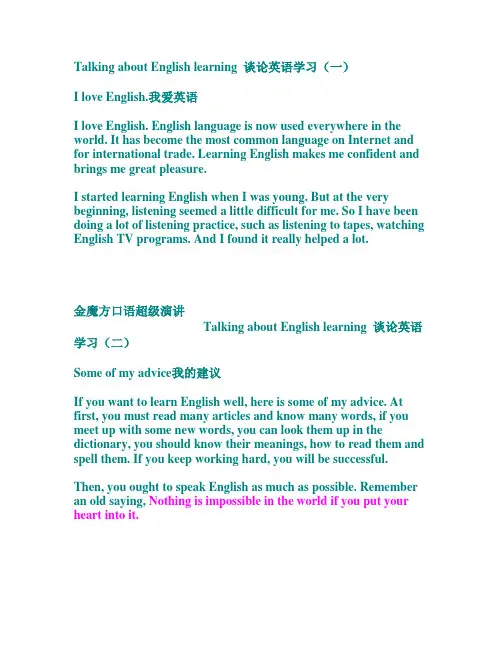
Talking about English learning 谈论英语学习(一)I love English.我爱英语I love English. English language is now used everywhere in the world. It has become the most common language on Internet and for international trade. Learning English makes me confident and brings me great pleasure.I started learning English when I was young. But at the very beginning, listening seemed a little difficult for me. So I have been doing a lot of listening practice, such as listening to tapes, watching English TV programs. And I found it really helped a lot.金魔方口语超级演讲Talking about English learning 谈论英语学习(二)Some of my advice我的建议If you want to learn English well, here is some of my advice. At first, you must read many articles and know many words, if you meet up with some new words, you can look them up in the dictionary, you should know their meanings, how to read them and spell them. If you keep working hard, you will be successful. Then, you ought to speak English as much as possible. Remember an old saying, Nothing is impossible in the world if you put your heart into it.金魔方口语超级演讲How to make friends 如何交朋友It's hard to make friends if you stay alone all the time. It's easier to make friends when you have similar interests.Don't be afraid to show people what you are really good at. Talk about the things you like and do best.Look at people in the eyes when you talk to them.Be a good listener. Let people talk about themselves before talking about yourself.Be friendly to a lot of people. Try to help your friends when they are in trouble because a friend in need is a friend indeed. That way you'll have a bigger group to choose from and have more chances to make friends.金魔方口语超级演讲Be kind to others 与人为善Human beings are advanced animals in the world. Some animals are very kind. For example , if you are kind to a dog , it will shake. It will tail to you. So if you are kind to others, they will also be kind to you.You have lots of chances to give your small kindness if you see a disabled person working in the street. You can help him to cross the street. If you meet a stranger, you can show him the way. If he or she asks you questions, you should be kind to answer them. That is you give small kindness to others. Maybe it seems to you a piece of cake, but it is very important to people in need. If you do this, the others will do it to you.Be kind to others, and they will be kind to you.金魔方情景英语会话演练Saying Goodbye 告别When you're far from friends and family, you can keep in touch with them by letters, post cards, short notes or phone calls.1.A: I've come to say goodbye.B: When are you off?A: I'm flying home on Sunday afternoon.B: Well, goodbye. See you soon.A: Please don't forget to say goodbye to the rest of the family for me.2.A: I'd like to say goodbye to everyone.B: What time are you going?A: My plane leaves at 7:25.B; Well, goodbye and have a good trip!A: Goodbye. Remember to look me up if you're ever in Washington.金魔方情景英语会话演练Saying Thank You 道谢When someone invites you for dinner, you can bringflowers,candy or a bottle of wine. Sometimes people send a thank you note to the host or hostess a few days after the event.1.A: I'd better be going.B: So soon? Why don't you stay a little longer?A: I wish I could, but it's already late.B: Oh, it's a shame that you have to leave.A: Thank you for a wonderful meal.B: I'm glad you enjoyed it.2.A: I really must be going now.B: But you just got here. Can't you stay a little longer? A: That's very nice of you, but I really can't.B: Well, it's too bad that you have to go.A: Thanks very much. It was a great party!B: It was our pleasure.金魔方情景英语会话演练Asking Favors 求助When you ask for things,陈莉( 2011-12-27 11:30:49)金魔方情景英语会话演练。
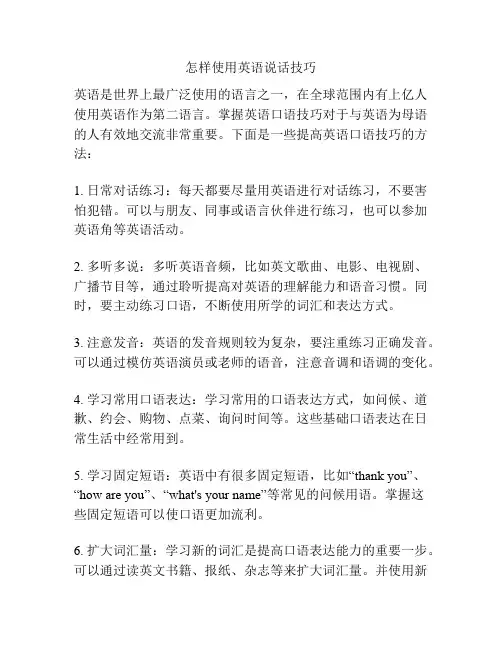
怎样使用英语说话技巧英语是世界上最广泛使用的语言之一,在全球范围内有上亿人使用英语作为第二语言。
掌握英语口语技巧对于与英语为母语的人有效地交流非常重要。
下面是一些提高英语口语技巧的方法:1. 日常对话练习:每天都要尽量用英语进行对话练习,不要害怕犯错。
可以与朋友、同事或语言伙伴进行练习,也可以参加英语角等英语活动。
2. 多听多说:多听英语音频,比如英文歌曲、电影、电视剧、广播节目等,通过聆听提高对英语的理解能力和语音习惯。
同时,要主动练习口语,不断使用所学的词汇和表达方式。
3. 注意发音:英语的发音规则较为复杂,要注重练习正确发音。
可以通过模仿英语演员或老师的语音,注意音调和语调的变化。
4. 学习常用口语表达:学习常用的口语表达方式,如问候、道歉、约会、购物、点菜、询问时间等。
这些基础口语表达在日常生活中经常用到。
5. 学习固定短语:英语中有很多固定短语,比如“thank you”、“how are you”、“what's your name”等常见的问候用语。
掌握这些固定短语可以使口语更加流利。
6. 扩大词汇量:学习新的词汇是提高口语表达能力的重要一步。
可以通过读英文书籍、报纸、杂志等来扩大词汇量。
并使用新学的词汇进行练习。
7. 积累常见句型:积累常见的句型,比如“Can I help you?”、“What's your opinion?”等,方便日常对话的进行。
8. 注意语法准确性:语法是语言的基础,要注意使用正确的语法结构来表达自己的观点。
9. 注重听力技巧:提高听力技巧对于理解他人的说话内容很重要。
可以通过听英文新闻、电视节目、英语课程等来提高听力能力。
10. 不断练习:最重要的是不断地练习,只有通过不断地实践,才能真正提高口语技巧。
总之,提高英语口语技巧需要不断地练习和积累,多与人交流,多听多说,并注重语法和发音的准确性。
通过坚持不懈的努力,你的英语口语能力必将大大提高。
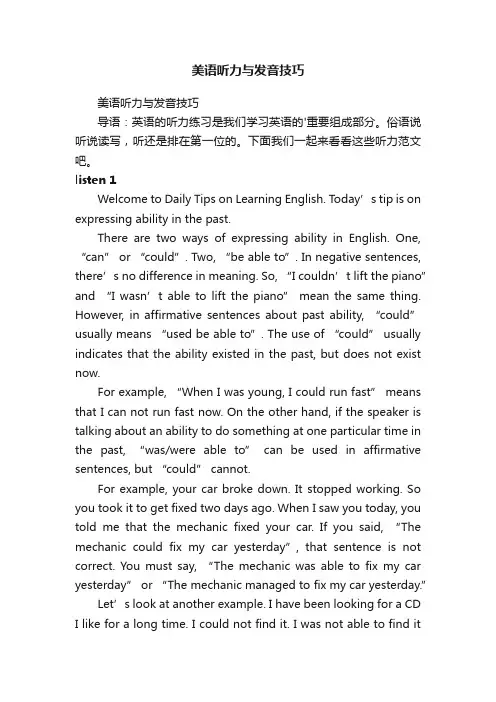
美语听力与发音技巧美语听力与发音技巧导语:英语的听力练习是我们学习英语的'重要组成部分。
俗语说听说读写,听还是排在第一位的。
下面我们一起来看看这些听力范文吧。
listen 1Welcome to Daily Tips on Learning English. Today’s tip is on expressing ability in the past.There are two ways of expressing ability in English. One, “can” or “could”. Two, “be able to”. In negative sentences, there’s no difference in meaning. So, “I couldn’t lift the piano” and “I wasn’t able to lift the piano” mean the same thing. However, in a ffirmative sentences about past ability, “could” usually means “used be able to”. The use of “could” usually indicates that the ability existed in the past, but does not exist now.For example, “When I was young, I could run fast” means that I can not run fast now. On the other hand, if the speaker is talking about an ability to do something at one particular time in the past, “was/were able to” can be used in affirmative sentences, but “could” cannot.For example, your car broke down. It stopped working. So you took it to get fixed two days ago. When I saw you today, you told me that the mechanic fixed your car. If you said, “The mechanic could fix my car yesterday”, that sentence is not correct. You must say, “The mechanic was able to fix my car yesterday”or “The mechanic managed to fix my car yesterday.”Let’s look at another example. I have been looking for a CD I like for a long time. I could not find it. I was not able to find itfor a long time. But yesterday I was able to find it. Yesterday I managed to find it. But you cannot say, “Yesterday I could find it.”Remember “I could not” and “I was not able to” are the same, but “I could” and “I was able to” are not the same. “I could” means I used to be able to, but now I’m not able to. “I was able to” me ans I have the ability at one particular time in the past.This has been today’s daily tip on learning English. Tune in tomorrow for another tip.listen 2Welcome to Daily Tips on Learning English. Today’s tip is on using the articles “a”, “an” and “the” c orrectly.Every student of English has my sympathy in his struggles with the English articles. They are one of the most difficult parts of learning English. First of all, I urge you to do this. Listen to native speakers. When you listen, listen carefully, since the articles “the” and “a” are almost never emphasized, they do not stand out prominently in speech, but they’re pronounced. You will have to train your ears so that you will recognize that the little sounds before certain words are articles, and not meaningless noises. Also, get in the habit of pronouncing the articles in the way native speakers do. As little sounds that are part of the word they precede. For instance, think of and say “the boy”as one word. Listen to this short sentence. The boy likes the girl. Say it naturally, the boy likes the girl. Did you notice how the articles are just small sounds linked to the nouns? Listen to another example. There is a pen on a desk in the classroom. Say it naturally, there is a pen on a desk in the classroom. Did you notice how all the sounds, especially articles are linked together?The article “an” is used before nouns beginning with a vowel sound, such as “an apple”. Notice how the “n” sound is linked to the word which follows it. Also notice that words that spelled with the letter “h” in the beginning such as “hour” also use the article “an” because the “h” isn’t pronounced. So we say, “an-our”, not “a hour”. And some words spelled with the letter “u” in the beginning such as “unicycle” use the article “a” because the first sound is the “y” sound “j”. So we say, a unicycle, not an unicycle.It’s also important to note that the pronunciation of the article “the” changes to “δi :” before words beginning with a vowel sound. So we say “δi :” elevator, not “δэ”elevator.Another tip is, do not be misled by newspaper headlines, advertisements and titles of book and so forth. They frequently omit articles which are necessary in complete sentences in both spoken and written English. Knowing when to use “a”, when to use “the”, and when not to use any article at all is undoubtably one of the most difficult aspects of learning English. We will talk about this topic more in an upcoming daily tip. Tune in tomorrow for another tip on learning English.listen 3Welcome to Daily Tips on Learning English. Today’s tip is on word stress on sentences.In general, it is true that content words are stressed whereas function words are not stressed. Content words usually convey the meaning of the sentence. Function words make the sentence grammatically correct. Content words are: nouns, main verbs, adjectives, adverbs, this, that, these, those, and “wh-“ words, who, what, when, why, how, which. Function words are: articles, such as “a” and “the”; possessive adjectives, such as “his”,“my”, “your”; prepositions, such as “in”, “on”, “of”; conjunctions, such as “and”, “but”; personal pronouns, such as “ I”, “he”, “she”; the “be” verb, “am”, “is”, “are”, “was”, “were”; and auxiliaries, such as “do”, “does”, “did”.Take for example the sen tence “Andrew brushes his teeth every morning.” The content word alone can convey the meaning of the sentence, namely “Andrew brushes teeth every morning.” The functional word “his” only makes the sentence grammatically correct. So “his” is unstressed, the other words are stressed. Why isn’t “his” stressed? Because of course he brushes his teeth, not your teeth, or my teeth. This we would naturally assume. If, however, Andrew brushes someone else’s teeth beside his own, then it would be very important to let your listener know that by stressing whose teeth he brushes.So, what words should be stressed? The simple answer is whatever words are important to the meaning you are trying to convey. if someone write the sentence on the board out of context and asks, “Which words are important? Which words should you stress?” You should answer, “That depends on the context.” Stress is used to let your listener know what is important to your message. If you stress words properly, your listener will have an easy time understanding your message. If you stress every word equally, then your listener will have to listen very carefully and try to guess the main point of your message. If your stress the wrong words, the listener will misunderstand your message or just feel very confused. So remember to stress the important words to your massage.This has been today’s daily tip. Tune in tomorrow for another tip on learning English.。
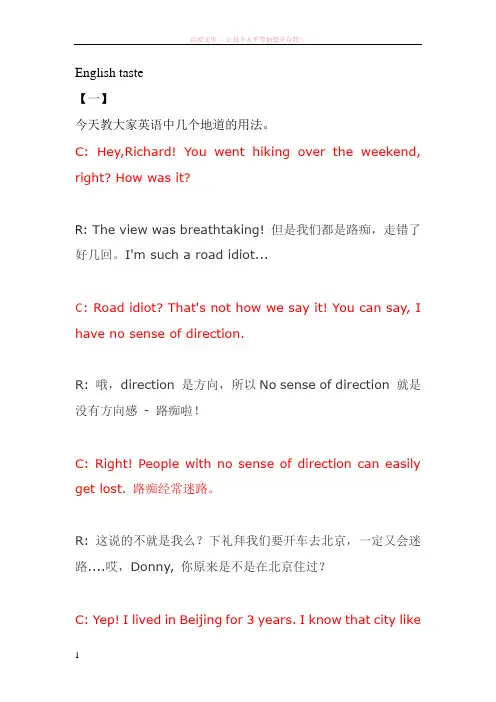
English taste【一】今天教大家英语中几个地道的用法。
C: Hey,Richard! You went hiking over the weekend, right? How was it?R: The view was breathtaking! 但是我们都是路痴,走错了好几回。
I'm such a road idiot...C: Road idiot? That's not how we say it! You can say, I have no sense of direction.R: 哦,direction 是方向,所以No sense of direction 就是没有方向感- 路痴啦!C: Right! People with no sense of direction can easily get lost. 路痴经常迷路。
R: 这说的不就是我么?下礼拜我们要开车去北京,一定又会迷路....哎,Donny, 你原来是不是在北京住过?C: Yep! I lived in Beijing for 3 years. I know that city likethe back of my hand.R:Like the back of your hand? 了如指掌?C: Exactly! It basically means that I know Beijing really well. You can also say: I know every nook and cranny of Beijing.R: Wait! Every nook and cranny? nook 一定是n-o-o-k, 那cranny 要怎么拼呢?C: Cranny is spelled c-r-a-n-n-y. When people say "every nook and cranny," they're talking about every tiny corner and out-of-the-way place.R: 第一:形容路痴可以说:somebody has no sense of direction;第二,对一个地方了如直掌,是know somewhere like the back of one's hand; 也可以说know every nook and cranny of a place.C : good for you,let's check next one.【二】C: Richard,你昨晚是不是没睡好?R: 是啊,因为走廊里有人半夜唱歌。
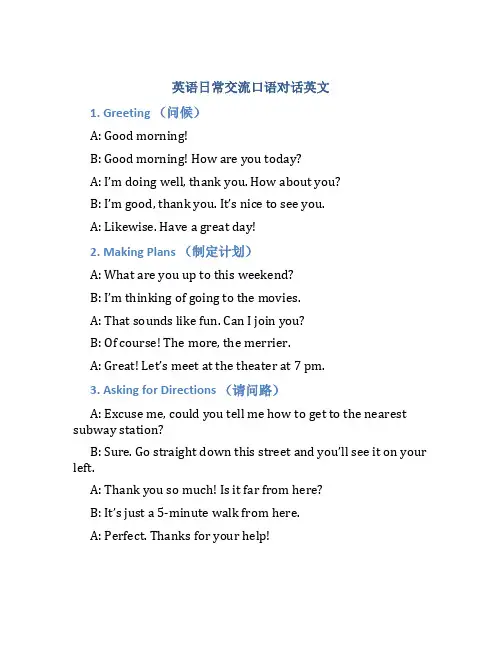
英语日常交流口语对话英文1. Greeting (问候)A: Good morning!B: Good morning! How are you today?A: I’m doing well, thank you. How about you?B: I’m good, thank you. It’s nice to see you.A: Likewise. Have a great day!2. Making Plans (制定计划)A: What are you up to this weekend?B: I’m thinking of going to the movies.A: That sounds like fun. Can I join you?B: Of course! The more, the merrier.A: Great! Let’s meet at the theater at 7 pm.3. Asking for Directions (请问路)A: Excuse me, could you tell me how to get to the nearest subway station?B: Sure. Go straight down this street and you’ll see it on your left.A: Thank you so much! Is it far from here?B: It’s just a 5-minute walk from here.A: Perfect. Thanks for your help!4. Ordering Food (点餐)A: Good evening! What would you like to order?B: I’ll have the spaghetti carbonara, please.A: Would you like anything to drink with that?B: Yes, I’ll have a glass of red wine, please.A: Certainly. Anything else?B: No, that’s all. Thank you.5. Talking about Hobbies (谈论爱好)A: What do you like to do in your free time?B: I enjoy playing the guitar and reading books.A: That’s cool. I like hiking and painting.B: Hiking must be so relaxing. I should try it sometime.A: Definitely! It’s a great way to unwind.6. Saying Goodbye (告别)A: It was nice catching up with you.B: Yes, it was great seeing you. Let’s do this again soon.A: Definitely. Take care and have a safe trip home.B: You too. See you later!This document provides various English phrases for everyday conversations, including greetings, making plans, asking for directions, ordering food, talking about hobbies, and saying goodbye. These phrases can be used in different situations to communicate effectively in English.。
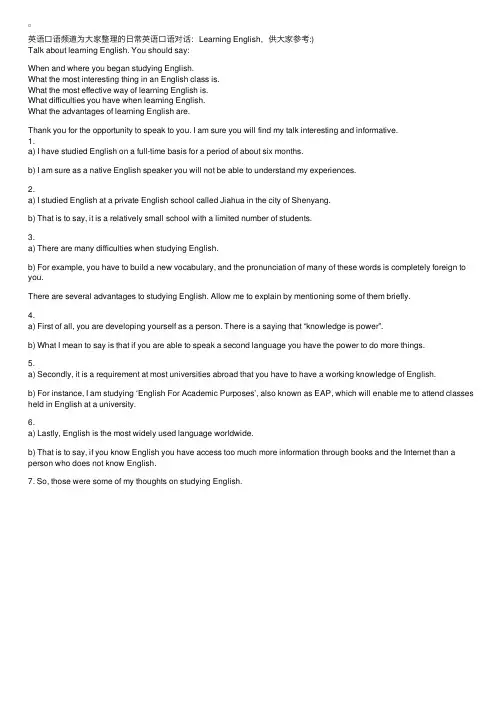
英语⼝语频道为⼤家整理的⽇常英语⼝语对话:Learning English,供⼤家参考:)Talk about learning English. You should say:When and where you began studying English.What the most interesting thing in an English class is.What the most effective way of learning English is.What difficulties you have when learning English.What the advantages of learning English are.Thank you for the opportunity to speak to you. I am sure you will find my talk interesting and informative.1.a) I have studied English on a full-time basis for a period of about six months.b) I am sure as a native English speaker you will not be able to understand my experiences.2.a) I studied English at a private English school called Jiahua in the city of Shenyang.b) That is to say, it is a relatively small school with a limited number of students.3.a) There are many difficulties when studying English.b) For example, you have to build a new vocabulary, and the pronunciation of many of these words is completely foreign to you.There are several advantages to studying English. Allow me to explain by mentioning some of them briefly.4.a) First of all, you are developing yourself as a person. There is a saying that “knowledge is power”.b) What I mean to say is that if you are able to speak a second language you have the power to do more things.5.a) Secondly, it is a requirement at most universities abroad that you have to have a working knowledge of English.b) For instance, I am studying ‘English For Academic Purposes’, also known as EAP, which will enable me to attend classes held in English at a university.6.a) Lastly, English is the most widely used language worldwide.b) That is to say, if you know English you have access too much more information through books and the Internet than a person who does not know English.7. So, those were some of my thoughts on studying English.。
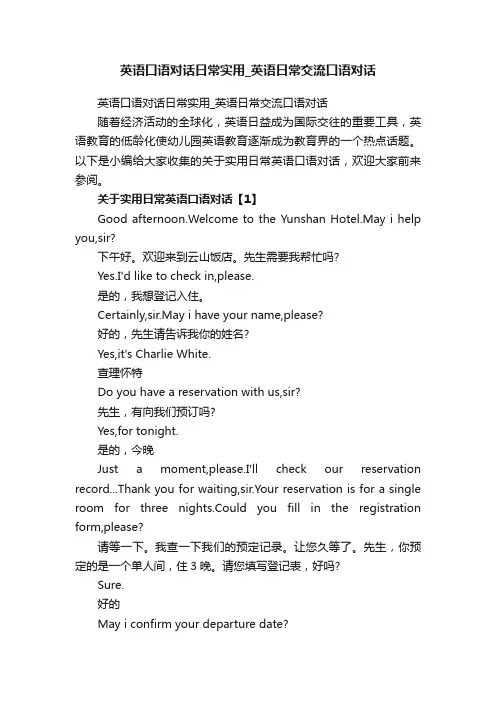
英语口语对话日常实用_英语日常交流口语对话英语口语对话日常实用_英语日常交流口语对话随着经济活动的全球化,英语日益成为国际交往的重要工具,英语教育的低龄化使幼儿园英语教育逐渐成为教育界的一个热点话题。
以下是小编给大家收集的关于实用日常英语口语对话,欢迎大家前来参阅。
关于实用日常英语口语对话【1】Good afternoon.Welcome to the Yunshan Hotel.May i help you,sir?下午好。
欢迎来到云山饭店。
先生需要我帮忙吗?Yes.I'd like to check in,please.是的,我想登记入住。
Certainly,sir.May i have your name,please?好的,先生请告诉我你的姓名?Yes,it's Charlie White.查理怀特Do you have a reservation with us,sir?先生,有向我们预订吗?Yes,for tonight.是的,今晚Just a moment,please.I'll check our reservation record...Thank you for waiting,sir.Your reservation is for a single room for three nights.Could you fill in the registration form,please?请等一下。
我查一下我们的预定记录。
让您久等了。
先生,你预定的是一个单人间,住3晚。
请您填写登记表,好吗?Sure.好的May i confirm your departure date?我想确认你的离开日期Yes,I should be leaving on the 8th.恩,我应该在8号离开How would you like to make payment?请问你想怎么付款?By Visa Card.Visa 卡May i take a print of the card,please?Thank you,sir.Your room is 888 on the 8th Floor.Just a moment please.A bellman will show you to your room.I hope you will enjoy your stay here.我能刷卡了吗?谢谢。
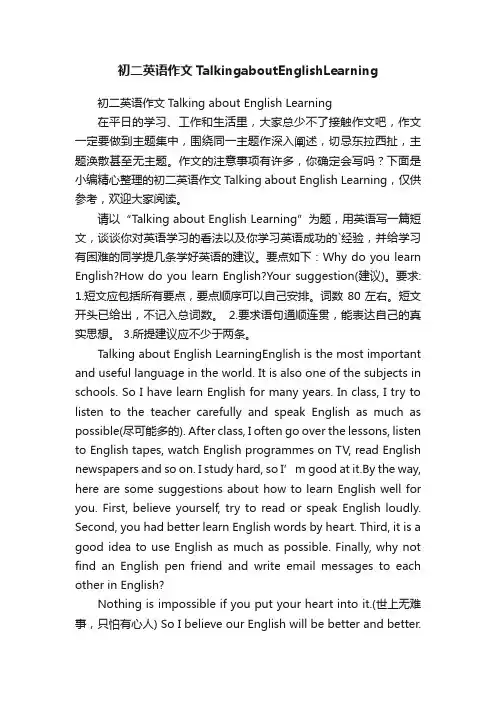
初二英语作文TalkingaboutEnglishLearning初二英语作文Talking about English Learning在平日的学习、工作和生活里,大家总少不了接触作文吧,作文一定要做到主题集中,围绕同一主题作深入阐述,切忌东拉西扯,主题涣散甚至无主题。
作文的注意事项有许多,你确定会写吗?下面是小编精心整理的初二英语作文Talking about English Learning,仅供参考,欢迎大家阅读。
请以“Talking about English Learning”为题,用英语写一篇短文,谈谈你对英语学习的看法以及你学习英语成功的`经验,并给学习有困难的同学提几条学好英语的建议。
要点如下:Why do you learn English?How do you learn English?Your suggestion(建议)。
要求: 1.短文应包括所有要点,要点顺序可以自己安排。
词数80左右。
短文开头已给出,不记入总词数。
2.要求语句通顺连贯,能表达自己的真实思想。
3.所提建议应不少于两条。
Talking about English LearningEnglish is the most important and useful language in the world. It is also one of the subjects in schools. So I have learn English for many years. In class, I try to listen to the teacher carefully and speak English as much as possible(尽可能多的). After class, I often go over the lessons, listen to English tapes, watch English programmes on TV, read English newspapers and so on. I study hard, so I’m good at it.By the way, here are some suggestions about how to learn English well for you. First, believe yourself, try to read or speak English loudly. Second, you had better learn English words by heart. Third, it is a good idea to use English as much as possible. Finally, why not find an English pen friend and write email messages to each other in English?Nothing is impossible if you put your heart into it.(世上无难事,只怕有心人) So I believe our English will be better and better.。
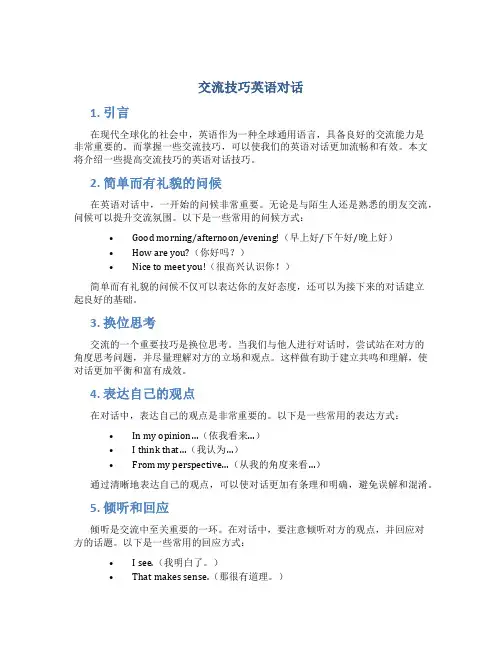
交流技巧英语对话1. 引言在现代全球化的社会中,英语作为一种全球通用语言,具备良好的交流能力是非常重要的。
而掌握一些交流技巧,可以使我们的英语对话更加流畅和有效。
本文将介绍一些提高交流技巧的英语对话技巧。
2. 简单而有礼貌的问候在英语对话中,一开始的问候非常重要。
无论是与陌生人还是熟悉的朋友交流,问候可以提升交流氛围。
以下是一些常用的问候方式:•Good morning/afternoon/evening!(早上好/下午好/晚上好)•How are you?(你好吗?)•Nice to meet you!(很高兴认识你!)简单而有礼貌的问候不仅可以表达你的友好态度,还可以为接下来的对话建立起良好的基础。
3. 换位思考交流的一个重要技巧是换位思考。
当我们与他人进行对话时,尝试站在对方的角度思考问题,并尽量理解对方的立场和观点。
这样做有助于建立共鸣和理解,使对话更加平衡和富有成效。
4. 表达自己的观点在对话中,表达自己的观点是非常重要的。
以下是一些常用的表达方式:•In my opinion…(依我看来…)•I think that…(我认为…)•From my pe rspective…(从我的角度来看…)通过清晰地表达自己的观点,可以使对话更加有条理和明确,避免误解和混淆。
5. 倾听和回应倾听是交流中至关重要的一环。
在对话中,要注意倾听对方的观点,并回应对方的话题。
以下是一些常用的回应方式:•I see.(我明白了。
)•That makes sense.(那很有道理。
)•I agree/disagree with you.(我同意/不同意你的观点。
)通过积极倾听和合理回应,可以建立起良好的对话互动,增强交流的效果。
6. 清晰表达意思在对话中,清晰地表达自己的意思是非常重要的。
以下是一些常用的表达方式:•Can you please repeat that?(你能再说一遍吗?)•I’m sorry, I don’t understand.(对不起,我不明白。
英语日常口语交流8000句(最新版)目录1.英语日常口语交流的重要性2.英语日常口语交流的难点3.学习英语日常口语交流的方法4.英语日常口语交流 8000 句的介绍和价值5.如何更有效地利用英语日常口语交流 8000 句正文英语日常口语交流在现代社会中具有重要的地位。
随着全球化的发展,英语已经成为世界范围内最重要的交流语言。
掌握英语日常口语交流能力,不仅可以帮助我们更好地与外国人沟通,还能提高我们在国际间的竞争力。
然而,英语日常口语交流也存在一些难点,例如发音、语调、语法和习惯用语等。
为了更好地学习英语日常口语交流,我们可以采取以下方法:1.多听:通过收听英语广播、观看英语电影和电视节目等,熟悉英语发音和语调,培养自己的英语语感。
2.多说:与外国人或者同样学习英语的朋友进行交流,提高自己的口语表达能力。
3.多读:阅读英语原著、报纸和杂志等,积累词汇和表达,了解英语国家的文化和习惯。
4.多写:用英语写日记、邮件和信件等,锻炼自己的英语写作能力,提高口语表达的准确性。
《英语日常口语交流 8000 句》是一本非常有价值的参考书。
它涵盖了日常生活、工作、旅游等各个方面的常用口语表达,对于学习英语日常口语交流有着很大的帮助。
通过学习这 8000 句,我们可以更好地了解英语国家的文化和习惯,提高我们的英语口语交流能力。
如何更有效地利用《英语日常口语交流 8000 句》呢?我们可以采取以下方法:1.制定学习计划:根据自己的学习进度和时间安排,制定合理的学习计划,确保每天都能学习一定的内容。
2.多做练习:通过模仿、角色扮演等方法,将所学内容应用到实际情景中,提高自己的口语表达能力。
3.创造语言环境:在生活中多与外国人或者同样学习英语的朋友交流,将所学内容运用到实际生活中,巩固所学知识。
4.定期复习:学习新知识的同时,不要忘记复习已学内容,以巩固记忆,确保所学知识不会遗忘。
英语日常口语交流能力的提高需要我们不断努力和学习。
推荐日常对话课英语作文Engaging in daily conversations is the heartbeat of language learning. It's where we practice the art of communication, from casual chats to deeper discussions.Starting with greetings is fundamental. A simple "Good morning!" sets the tone for a friendly exchange. It's a universal opener that bridges the gap between strangers and acquaintances.Expanding our vocabulary through daily dialogues is crucial. Learning new words and phrases in context helps in understanding the nuances of the language and enhances our ability to express ourselves more vividly.Practicing pronunciation is another key aspect. Mimicking native speakers in casual conversations can fine-tune our accents and make our speech more natural and fluid.Listening actively in conversations is just as important as speaking. It sharpens our comprehension skills and helps us pick up on the subtleties of the language, such as idiomatic expressions and cultural references.Incorporating humor into our conversations can make language learning enjoyable. It lightens the mood and makes the process of learning feel less like a chore and more like a shared experience.Reflecting on conversations can be insightful. Reviewing what we've learned and identifying areas for improvementhelps us grow as speakers and communicators.Finally, embracing mistakes in our dialogues is essential. They are stepping stones to fluency, offering us the opportunity to learn from our errors and refine our language skills.。
闲聊技巧英语作文Talking is a fundamental form of human communication. It helps us connect with others, share our thoughts and feelings, and build relationships. Good conversation skills are essential in both personal and professional settings.交谈是人类交流的一种基本形式。
它帮助我们与他人建立联系,分享我们的想法和感受,并建立关系。
良好的谈话技巧在个人和职业环境中都是至关重要的。
In order to engage in meaningful and enjoyable conversations, it is important to develop good conversation skills. This includes being a good listener, asking open-ended questions, showing genuine interest in the other person, and being able to share your own thoughts and experiences.为了进行有意义且愉快的对话,重要的是要发展良好的谈话技巧。
这包括成为一个好的倾听者,提出开放式问题,展示对另一方的真诚兴趣,以及能够分享自己的想法和经验。
Being a good listener is crucial in any conversation. It shows that you are paying attention to the other person and that you value what they have to say. Listening involves more than just hearing the words – it also involves understanding the message behind the words, the emotions being expressed, and the underlying meaning.成为一个好的倾听者在任何对话中都至关重要。
日常英语交流口语As an AI language model, I don't have personal experience of speaking English on a daily basis. However, I can provide some sample English dialogues based on daily scenarios.Scenario 1: At a coffee shopA: Hi, can I get an iced coffee, please?B: Sure, would you like any milk or sugar in that?A: Yes, just a splash of milk, please.B: Got it. Would you like anything else?A: No, that's all for now. Thank you.Scenario 2: At a supermarket checkoutA: Hi, how are you today?B: I'm good, thanks. How about you?A: I'm doing good. Can you bag the groceries, please?B: Sure thing. Do you have a preferred bagging method or do you want me to do it according to the category?A: Please bag it according to the category. Thanks.B: No problem. Your total comes up to $23.50. How would you like to pay?A: I'll pay by card.B: Alright, please insert your card here. Thank you.Scenario 3: At a work meetingA: Good morning, everyone. Let's start with a brief update from each department. Marketing, do you want to go first?B: Sure, we've been doing great with social media engagement and have increased our followers by 20% this quarter.A: That's fantastic, thanks for sharing. How about finance?C: We've been able to reduce expenses by 10% and increase profits by 5% compared to last year.A: Great job, that's excellent news. Operations, how are things going?D: We've been able to streamline our production process and reduce production time by 15%.A: That's impressive, keep up the good work. Any questions or comments?Scenario 4: At a friend's houseA: Hey, thanks for having me over. This place looks amazing!B: Thanks, glad you like it. Can I get you a drink or something to eat?A: Yes, please. Can I have a glass of water and some snacks if you have any?B: Sure, I have some chips and salsa if you're interested.A: Sounds perfect. So, how have you been?B: I've been good, busy with work and family stuff. How about you?A: Same here. Work has been hectic, but I'm trying to stay on top of things.Scenario 5: At a doctor's officeA: Hi, I have an appointment at 11 with Dr. Smith.B: Hi, yes. Have a seat, please. Dr. Smith will be with you shortly.A: Thanks. Is there any paperwork I need to fill out?B: Yes, please fill out this form with your personal and medical information.A: Alright, will do. (After filling out the form) I'm done with this. Where should I submit it?B: You can submit it at the front desk. Dr. Smith will see you in a few minutes.A: Great, thank you.These are just a few examples of daily English dialogues. In order to improve your communication skills, it's important to practice speaking in English as much as possible. Reading, listening to English news, and watching English TV shows and movies can also help improve your comprehension and vocabulary.。
怎么锻炼英语对话能力作文Hey, practicing English conversation skills is all about being confident and fearless. Don't be afraid to make mistakes, because that's how you learn and improve. Just go for it and start talking to people in English whenever you get the chance.One great way to improve your English speaking skills is by watching English movies or TV shows. Pay attention to how the characters speak and try to mimic their pronunciation and intonation. It's a fun and effective way to pick up new phrases and expressions.Another useful tip is to find a language exchange partner. This can be someone who wants to practice English with you while you help them with your native language.It's a great way to have real conversations and learn from each other.Don't forget to practice speaking English out loud onyour own as well. You can try narrating your daily activities, describing objects around you, or even having imaginary conversations with yourself. The more you speak, the more confident you'll become.Lastly, don't underestimate the power of listening. Pay attention to how native speakers communicate and try to imitate their rhythm and tone. The more you expose yourself to English conversations, the better you'll become at engaging in them yourself. So keep practicing and don't give up!。
【学习】英语口语训练素材:日常交流对话引言大家都知道,英语是一门全球通用的语言,掌握好英语口语对我们的学习、工作和生活都有着重要的意义。
但是,从课本中学到的知识往往不能帮助我们在实际交流中灵活运用,所以我们需要一些日常生活中的对话素材来训练口语表达能力。
本文将为大家提供一些实用的日常交流对话素材,希望能帮助到大家提高英语口语水平。
第一部分:问候与介绍H1:问候在日常生活中,我们经常需要用到问候的句子来与他人打招呼。
以下是一些常见的问候方式:H2:早上好•Good morning!(早上好!)•How are you this morning?(今天早上你好吗?)•Did you have a good sleep?(你睡得好吗?)H2:下午好•Good afternoon!(下午好!)•How is your day going?(你今天过得怎么样?)•Are you enjoying the weather today?(你觉得今天的天气怎么样?)H2:晚上好•Good evening!(晚上好!)•How was your day?(你今天过得怎么样?)•Did you do anything fun today?(你今天做了什么有趣的事情?)H1:介绍在初次认识他人或进入新的社交场合时,我们需要用到一些自我介绍的句子。
以下是一些常见的自我介绍方式:H2:打招呼•Hi, I'm [Your Name]. Nice to meet you!(嗨,我叫[你的名字]。
很高兴见到你!)•Hello, my name is [Your Name]. It's a pleasure to meet you!(你好,我叫[你的名字]。
很高兴见到你!)•Hey, I'm [Your Name]. How do you do?(嘿,我叫[你的名字]。
你好吗?)H2:介绍个人信息•I'm [Your Name], and I'm from [Your Country].(我叫[你的名字],我来自[你的国家]。
English taste【一】今天教大家英语中几个地道的用法。
C: Hey,Richard! You went hiking over the weekend, right? How was it?R: The view was breathtaking! 但是我们都是路痴,走错了好几回。
I'm such a road idiot...C: Road idiot? That's not how we say it! You can say, I have no sense of direction.R: 哦,direction 是方向,所以No sense of direction 就是没有方向感- 路痴啦!C: Right! People with no sense of direction can easily get lost. 路痴经常迷路。
R: 这说的不就是我么?下礼拜我们要开车去北京,一定又会迷路....哎,Donny, 你原来是不是在北京住过?C: Yep! I lived in Beijing for 3 years. I know that city likethe back of my hand.R:Like the back of your hand? 了如指掌?C: Exactly! It basically means that I know Beijing really well. You can also say: I know every nook and cranny of Beijing.R: Wait! Every nook and cranny? nook 一定是n-o-o-k, 那cranny 要怎么拼呢?C: Cranny is spelled c-r-a-n-n-y. When people say "every nook and cranny," they're talking about every tiny corner and out-of-the-way place.R: 第一:形容路痴可以说:somebody has no sense of direction;第二,对一个地方了如直掌,是know somewhere like the back of one's hand; 也可以说know every nook and cranny of a place.C : good for you,let's check next one.【二】C: Richard,你昨晚是不是没睡好?R: 是啊,因为走廊里有人半夜唱歌。
C: Dude, that sucks!R: 所以我今天心情特别不好,I'm easy to burn!C: Easy to burn? Richard, I have to say, you've got a talent for making up English phrases.R: 好吧,那“火爆脾气”在美语里怎么说?C: You say I have a short fuse. fuse is spelled f-u-s-e. To say someone has a short fuse is to say he or she has a bad temper.R:fuse是导火线的意思,a short fuse,就是很短的导火线,那还真是“一点就着”,所以have a short fuse就是形容脾气差。
C: That's correct. If I were you, I'd go give that guy who sings in the middle of the night a piece of my mind! R: give him a piece of your mind?C: Yes! You can also tell him off, 都是“骂他一顿”的意思。
R: Actually, I was about to rush out of the door and tell him off, but my dorm mates stopped me.C: Why?R: 我室友们说,他可能心情不好,让我别往心里去。
C: Your dorm mates are so nice not to take it personally. R :take it personally 就是往心里去,计较,对么?C: Exactly. For example, your boss has a short fuse and often yells at people when they make minor mistakes......R:所以我们也可以这样说:If someone gives me a piece of his mind for something minor, 别人就会说"don't take it personally. " 对不对?C: Bingo! Let's see what you've learned !R: 第一,火爆脾气是have a short fuse;第二,口头教训别人是give someone a piece of my mind, 或者tell someone off第三,别往心里去是Don't take it personally.【三】及时行乐R: Claire how was your date last night? I heard he was quite a looker!C: 唉,怎么说呢...这男生长得是不错,可是话不投机! 我说我爱游泳,他说小心被淹,我说我爱旅游,他说旅游就是花钱买罪受!R: Really? He's a Debbie downer!C: Debbie? 他不叫Debbie.R: No, Debbie downer refers to those who are so negative and always bring down the mood of other people.C: 我明白了,说一个人特消极,老说丧气话打击别人,就可以用Debbie downer. My date from last night was such a Debbie downer that I went home with a heavy heart!R: That was no fun! We shouldn't let a Debbie downer ruin our high spirits.C: 那欢积极向上,阳光型的人用英语怎么说呢?R: You can say he has a sunny personality.C: 嗯! I want to go out with a man who has a sunny personality. He can cheer me up when I'm moody.R: I used to date a girl like that! she is the most positive person I've ever known and she always seems so contend.C: 那及时行乐又怎么说呢?R: We say "eat, drink and be merry."C: Eat, drink and be merry. 吃,喝,快快乐乐。
Gosh! This is my motto in life!R: It is mine, too!C:今天我们学了:阴沉丧气的人是Debbie downer, 阳光向上的性格是sunny personality, 及时行乐则是to eat, drink and be merry.【四】C: Richard,what are you doing on the computer?You've spent hours on the Internet!R: Jessica, 我下个月要去意大利,出门在外,不先看看旅游攻略怎么行?C: 攻略?Are you going to attack Italy?R: 哪有! 旅游攻略就是去过那里的人写的心得体会,总结建议,这在英语里要怎么说呢?C: I see. You were referring to travel tips. You are right, flipping through travel guide books and get some tips from the Internet can be really helpful, especially when it is your first trip to a new place.R: Yep! For example, I was just looking for ways to get discount on museum tickets, and some of the tips that people shared online came in really handy!C: Make good use of the tips. They also help you avoid tourist traps!R: Tourist traps? 哦,就是旅行陷阱吧! 这个最烦人了,Tourist traps are annoying and can spoil the whole trip!C: So, how long are you going to stay in Italy?R: Four days。
C: Four days only? So you are going to stay in one city?R: Actually I'm going to tour 4 cities and they are far away from each other.C: I see. This is a whirlwind tour then.R: W-h-i-r-l-w-i-n-d, whirlwind 是旋风的意思,whirlwind tour 就是旋风旅游,也就是一阵风似的在很短的时间内去很多地方走马观花。